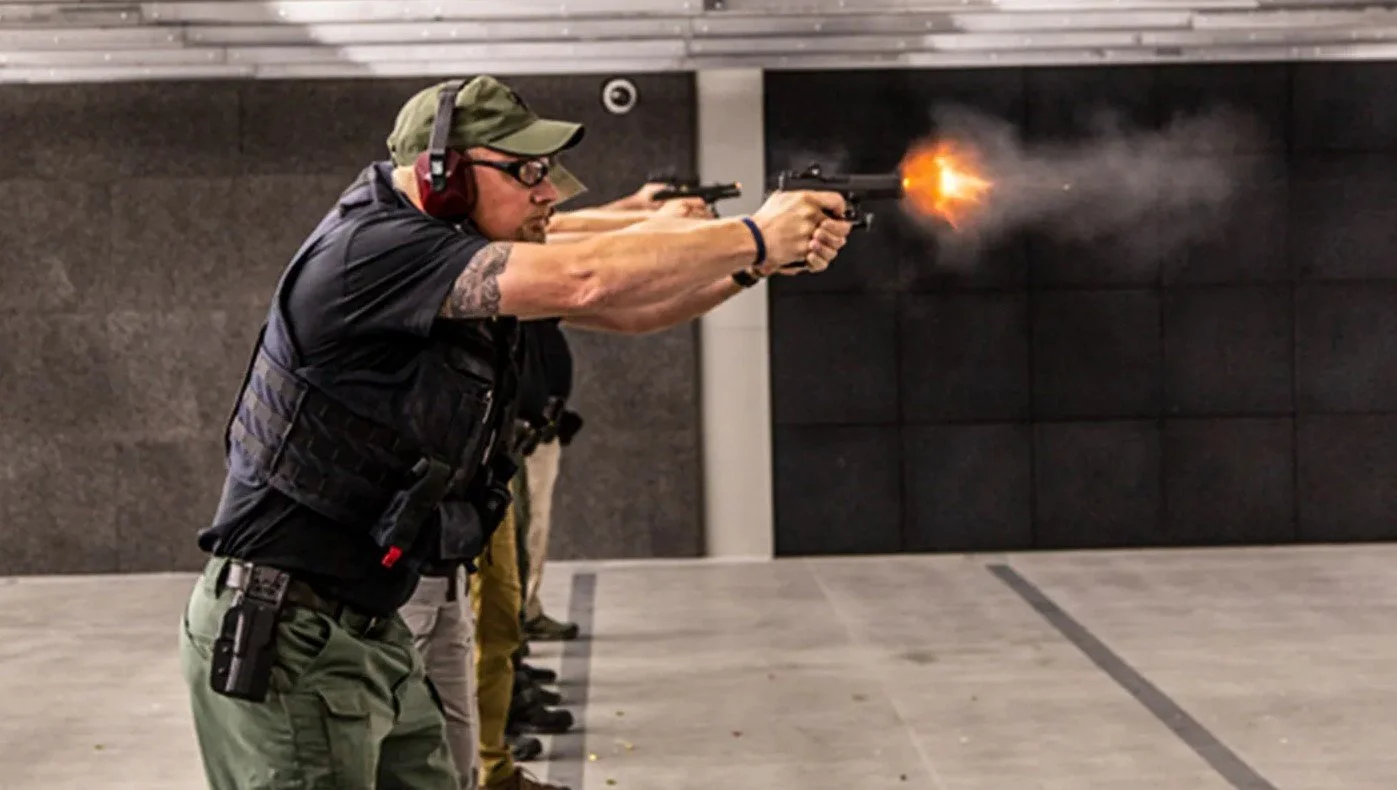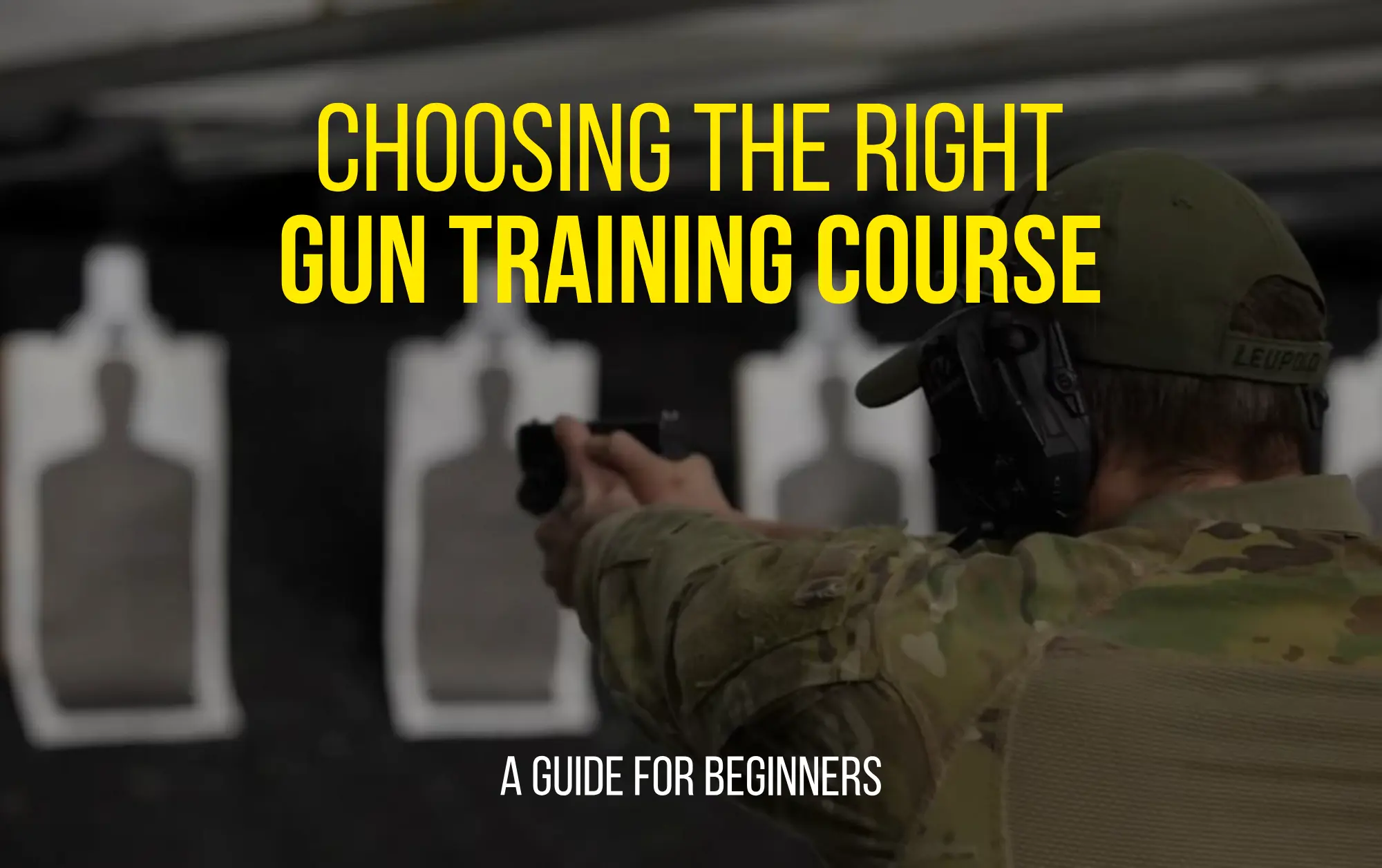So, you’re a gun noob, and you’ve just got your first gun. You want to test it on the range.
🛑Hold on. That’s not how things work with something that can seriously wound or even kill you or others around you. What you need is proper gun training. But how do you choose the right gun training school? What type of gun class best fits your needs?
To make the right decision, you need to consider the following questions. But first…
Without question, beginners absolutely need basic gun safety training!
Read more: Why Gun Safety Training is Important
Reasons for owning a gun are pretty clear-cut: concealed carry, home defense, hunting, shooting competitions, tactical games, and plinking. Typically, the reason you bought a gun dictates the type of course or school you need – it’s as simple as that.
But don’t rush into things. If you’re a beginner, you must start with BASIC GUN TRAINING. This will teach you how to safely handle and use handguns, rifles, or shotguns. Only after you’ve learned the basics of gun safety (ideally, the course should include hands-on training) and developed basic shooting skills can you move on to more specialized training, like room clearing or defensive handgun shooting.
1. What gun training do you need?
Once you have the basics down, some gun owners might want to explore more specialized, practice-focused courses. It’s important to understand that no course will teach you EVERYTHING all at once. You need to take it step by step, gradually diving deeper into your chosen specialty.
So, which training program is right for you?
Almost every school or gun range offers a tactical training course since self-defense is the reason numero uno for owning a gun in the U.S. Tactical training teaches you self-defense strategies and might involve movement, shooting under pressure, and advanced weapon handling. If you have a gun for protection, look into defensive shooting courses offered by your local shooting ranges or search for a specialized tactical shooting school.
Also, consider defensive training courses offered by organizations like the NRA (Refuse to be a Victim, Personal Protection in the Home (or Outside the Home), or Defensive Pistol), or USCCA (Home Defense or Defensive Shooting Fundamentals). These courses are taught online, too.

It’s worth mentioning concealed carry courses here. Generally, CCW classes aren’t where you learn to shoot or other practical skills. Instead, they provide training with a written test and range exam – this is required to get a Concealed Carry Permit (CCP), or License to Carry (LTC) in Texas.
If you’ve recently discovered a passion for hunting, search online for hunter education courses and hunting programs that will teach you about hunting safety, shot placement, and other essential topics. In Texas, a great place to start your research is Texas Parks & Wildlife. There, you can even find species-specific courses that focus on deer, turkey, and waterfowl hunting.
If you’re interested in becoming a competitive shooter, look for beginner competitive shooting courses. Start by checking out your local gun ranges. Handgun and rifle classes are common. However, shotgun shooting ranges can be harder to locate due to safety requirements that often place them in rural areas. You might also want to check out firearms associations.
When searching for competitive shooting classes, be specific about the discipline, such as 3-gun training or long-range precision rifle shooting training.
2. How do you like to train?
This is where you zero in on the more specific aspects of your gun education.
Take a look at the program for the class you’re considering and ask yourself questions about each part of it. For example, how much time do you want to spend on the range compared to time spent in the classroom? Some courses consist entirely of live-fire range time, while others blend this with some theory. Of course, the balance depends on the type of course you’re taking. But there might be differences between similar courses that could sway your decision.
Next, consider whether you’d prefer to learn from a male or female instructor. Would you feel more comfortable in an all-female environment? These days, female gun training courses are common, and finding a skilled female instructor and women-only classes isn’t difficult.
Also, consider whether you’d like group or private gun training, offline or online.
Is online firearm training worth it?
There are lots of online firearm classes taught by experts, such as NRA training, courses by Panteao Productions, and many good YouTube videos. These can teach you a lot about how guns work, how to be safe with them, and the basics of using a gun.
However, we think in-person gun classes are better, as you get expert supervision, instant feedback, and hands-on training in a safe environment.
Check out our gun training courses for beginners
Basic Rifle Safety
Intro to Basic Rifle Skills
Basic Handgun Safety
Intro to Basic Pistol Skills
3. What does the course include?
Some courses require you to come prepared with certain items like ammunition and equipment – think eye and ear protection, extra magazines, a holster, and so on. Beginner gun courses often provide basic gear and ammunition (or snap caps). However, you might find that some classes aimed at intermediate gun owners expect you to bring your own ammunition.
If you’re an absolute beginner without a gun of your own yet, gun training offers you a chance to figure out which firearm is the best fit for you. For example, the GRITR shooting range provides pistol and rifle courses that include rental guns. Essentially, this means you can take a Glock training course without having to buy your own pistol first, giving you the flexibility to change your mind later and choose a Sig Sauer or CZ instead.
Things to Consider When Choosing a Gun Training Course
Accreditation and Certification: Ensure the course you choose comes with recognized accreditation and certifications. Look for courses endorsed or approved by bodies such as the NRA, USCCA, law enforcement agencies, or experienced and respected trainers.
Instructor Qualifications and Experience: The expertise of your instructor is a significant influencer in the quality of your training. Instructors with extensive backgrounds in firearms, military service, or law enforcement are typically preferred.
Training Facility and Equipment: The environment in which you train can significantly impact your experience. Look for facilities with well-maintained ranges, realistic training scenarios, and appropriate safety protocols. The availability of equipment and gear is also crucial.
Research and Evaluate Local Gun Training Providers
Online Reviews and Testimonials: Search for testimonials and reviews from past participants to gain insight into the course’s quality, structure, and effectiveness.
Recommendations from Other Gun Owners: Personal recommendations from trusted sources can be invaluable. Fellow gun owners can provide first-hand experiences and suggestions.
Visiting Training Facilities and Observing Classes: Whenever possible, visit the training facility to get a feel for the environment and observe the teaching style. This can help in gauging the professionalism and suitability of the course.
FAQ
A beginner gun training class should cover basics like firearm safety, proper handling, and basic shooting techniques. It’s also a good idea to find a course that caters to beginners specifically, providing a supportive and informative environment.
Yes, many organizations offer gun training classes taught by female instructors and in a women-only environment.
You can search online or check with local shooting ranges, gun shops, or community centers. Some organizations also offer location-based search tools on their websites.
Yes, some organizations offer online gun training courses. However, these should ideally be supplemented with practical, hands-on training under the supervision of a certified instructor.
Defensive gun training focuses on using firearms in self-defense scenarios. It covers topics like situational awareness, threat assessment, and shooting under stress.
Gun license training prepares you for obtaining a firearm license. It typically covers local and national firearm laws, safe handling and storage practices, and may prepare you for any required written and practical tests.
